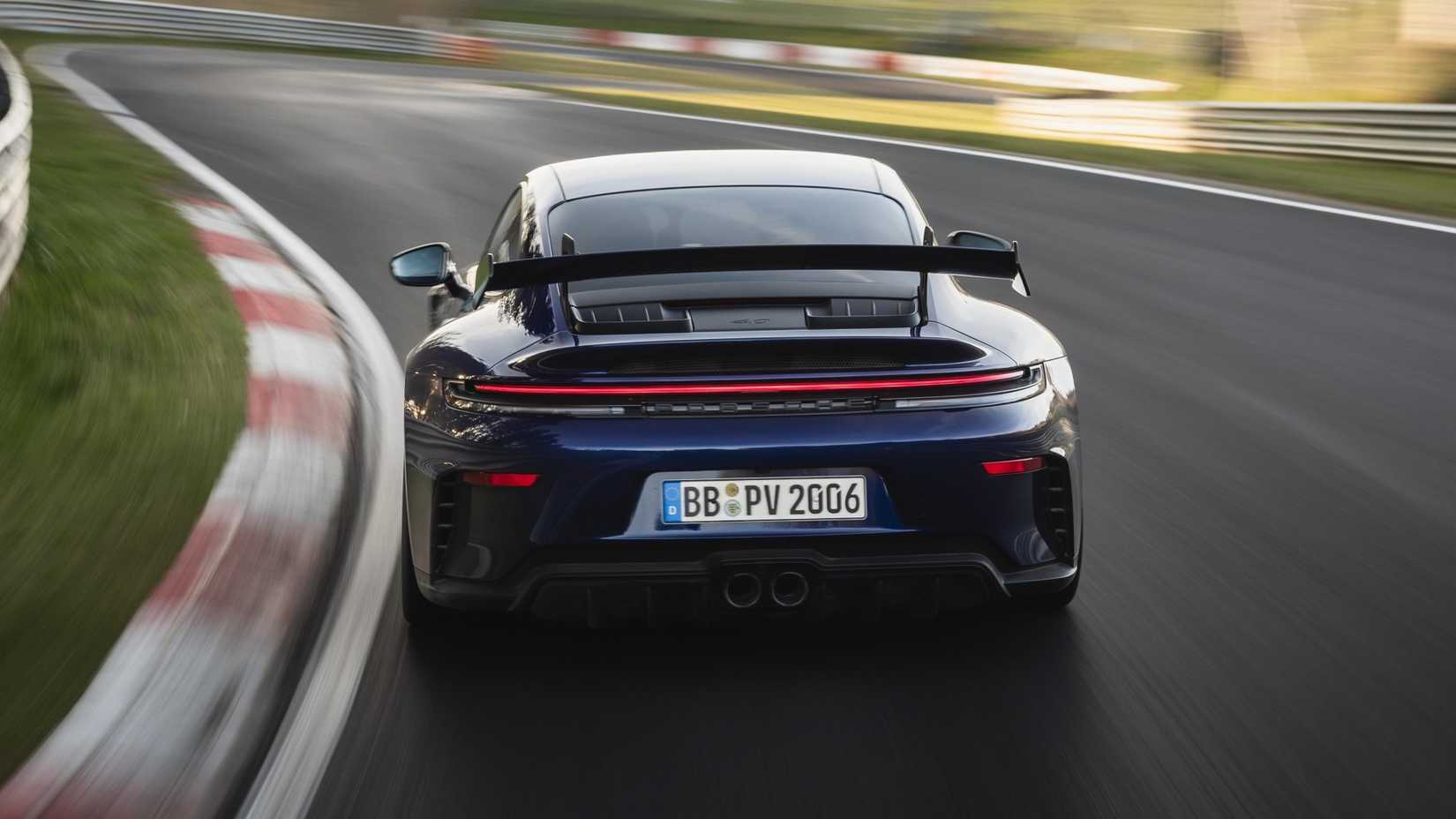The Nürburgring Nordschleife isn’t just another racetrack; it’s the ultimate proving ground for performance cars. Stretching 20.8 kilometers through Germany’s Eifel mountains, the Green Hell is infamous for punishing machines that rely on brute force while rewarding those who master balance, grip, and aerodynamics. That’s why lap times here matter more than almost anywhere else. It’s easy to assume that a 3,000-horsepower hypercar would dominate the leaderboard, but history has repeatedly shown that raw power alone is never enough to conquer the Nordschleife.
Instead, it’s often precision-engineered supercars, sometimes with half or even a fraction of that output, that deliver the most jaw-dropping times. The best examples combine finely tuned chassis setups, clever aerodynamics, and impeccable power delivery to slice through corners and maintain relentless pace across the circuit. These cars prove that finesse and engineering wizardry can often keep pace with, and in some cases embarrass, far more powerful machines.
To give you the most up-to-date and accurate information possible, the data used to compile this article was sourced from various manufacturers and other authoritative sources. Models are listed from the “slowest” lap time to the fastest.
Ferrari 488 Pista
Nürburgring Lap Time: 7:00,03
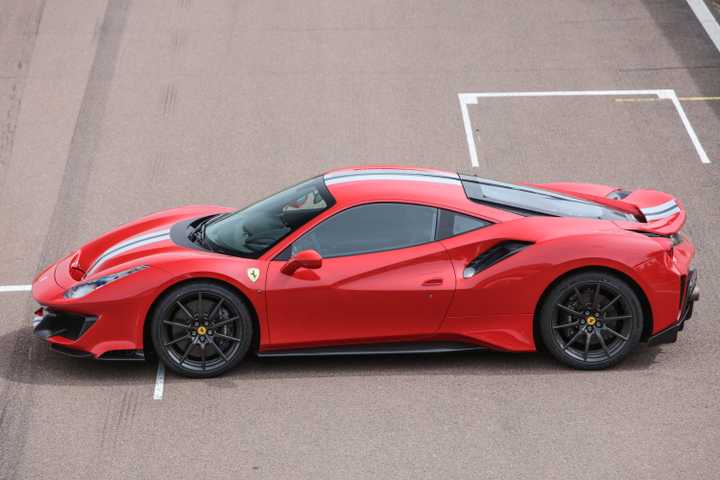
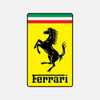
- Base Trim Engine
-
3.9L Twin-Turbo V8 Gas
- Base Trim Transmission
-
7-Speed Automatic
- Base Trim Drivetrain
-
Rear-Wheel Drive
- Base Trim Horsepower
-
711 hp
- Base Trim Torque
-
567 lb-ft @ 3000 rpm
- Fuel Economy
-
15/20 MPG
- Make
-
Ferrari
- Model
-
488 Pista
- Segment
-
Supercar
The Ferrari 488 Pista is one of the last truly hardcore mid-engined V8 Ferraris before hybridization took over Maranello’s lineup. Its 3.9-liter twin-turbocharged V8 produces 711 horsepower, and yet the Pista isn’t simply about numbers. Ferrari focused on weight reduction, sharper aerodynamics, and a lightning-quick dual-clutch transmission to transform the 488 into a weapon specifically built for circuits. The result is a car that feels almost tailor-made for the Nürburgring, where agility often counts for more than straight-line thrust.
With a lap time of 7:00,03, the Pista proves its credentials against far more powerful competitors. Ferrari achieved this not through excess horsepower, but by ensuring every element from suspension tuning to braking performance operated in perfect harmony. The lightweight carbon-fiber bodywork, Formula 1-inspired aero solutions, and razor-sharp steering give the Pista a level of precision that helps it attack corners at speeds few supercars can sustain.
What makes the Pista’s lap time even more impressive is that it was achieved without resorting to all-wheel drive or hybrid trickery. On paper, it shouldn’t be able to hang with cars pushing double its power output, but on the Green Hell, it does exactly that. It’s proof that Ferrari’s traditional approach of chassis mastery and balance can still keep pace with technological sledgehammers.
Ferrari 296 GTB
Nürburgring Lap Time: 6:58,70
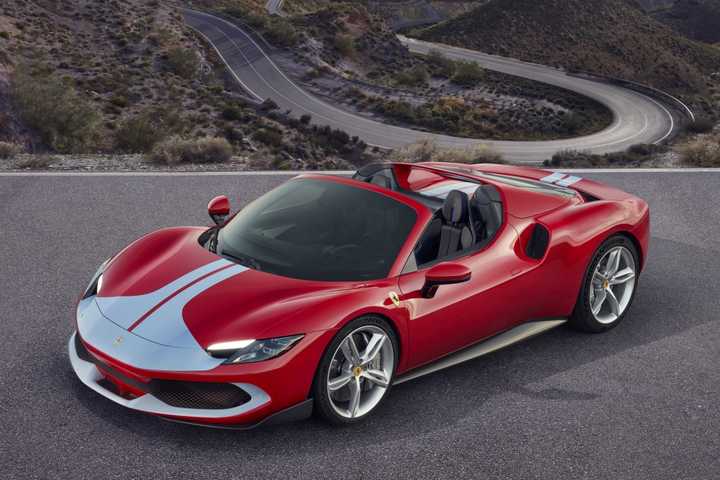

- Base Trim Engine
-
3.0L Twin-Turbo V6 Plug-in Hybrid
- Base Trim Transmission
-
8-Speed Automatic
- Base Trim Drivetrain
-
Rear-Wheel Drive
- Base Trim Horsepower
-
819 hp
- Base Trim Torque
-
545 lb-ft @ 6250 rpm
- Fuel Economy
-
18/22 MPG
- Make
-
Ferrari
- Model
-
296 GTS
- Segment
-
Supercar
The 296 GTB marked Ferrari’s bold step into the hybrid era, and it wasted no time proving itself as one of the most formidable performance cars of its generation. With a 3.0-liter twin-turbocharged V6 paired with an electric motor, the car produces a combined 819 horsepower. Unlike some hybrids, the 296 GTB doesn’t feel like a compromise; it feels like a precision instrument sharpened for both efficiency and speed. The Nürburgring provided the perfect playground to showcase just how well Ferrari blended cutting-edge hybrid technology with classic driving excitement.
At 6:58,70, the 296 GTB officially joined the sub-seven-minute club, placing it among the greatest performance machines ever to lap the Nordschleife. Much of this speed comes from its seamless integration of electric torque with combustion power, giving it immediate acceleration out of tight corners. Add to that Ferrari’s advanced aero and electronically controlled differential, and you get a car that not only grips, but dances across the most treacherous corners of the track.
Perhaps the most impressive thing about the 296 GTB is that it delivers this performance while remaining one of Ferrari’s most usable modern supercars. It may be a technological powerhouse, but it doesn’t overwhelm the driver with complexity. Instead, it feels intuitive, rewarding, and blisteringly quick, proving that hybrid supercars aren’t just about efficiency; they can be Nürburgring giants.
Porsche 918 Spyder
Nürburgring Lap Time: 6:57,00
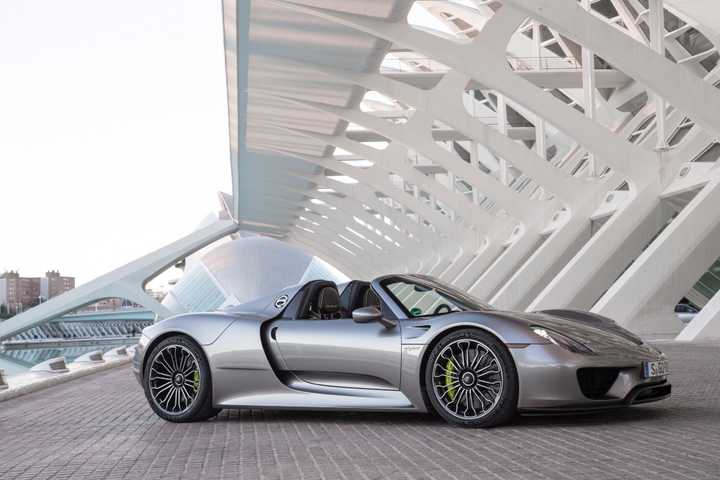
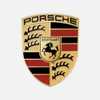
- Base Trim Engine
-
4.6L V8 Plug-in Hybrid
- Base Trim Transmission
-
7-Speed Automatic
- Base Trim Drivetrain
-
All-Wheel Drive
- Base Trim Horsepower
-
887 hp
- Base Trim Torque
-
944 lb-ft @ 5000 rpm
- Fuel Economy
-
20/24 MPG
- Make
-
Porsche
- Model
-
918 Spyder
- Segment
-
Supercar
The Porsche 918 Spyder is one of the legendary “holy trinity” hypercars of the 2010s, and it remains a benchmark for what hybrid performance can achieve. Packing a naturally aspirated 4.6-liter V8 alongside dual electric motors, the 918 Spyder delivers a combined 887 horsepower. But what really sets it apart is its advanced torque vectoring system and all-wheel drive, which allow the car to deploy that power with surgical precision. On a circuit as punishing as the Nordschleife, control often means more than outright power, and the 918 has it in spades.
With a 6:57 lap time, the 918 Spyder became the first production car to officially break the seven-minute barrier, cementing its place in history. This achievement was no accident. It was the culmination of Porsche’s obsessive pursuit of weight distribution, regenerative braking, and aerodynamic stability. Even today, over a decade later, its time remains competitive against far newer machines, showing just how far ahead of its time it was.
The 918 Spyder also demonstrates an important truth about the Nürburgring: consistency beats chaos. Where a 3,000-horsepower monster like the Yangwang U9 Extreme might struggle to put down its massive power, the 918 calmly delivers balanced performance lap after lap. It may not scream with extreme numbers, but its composure makes it one of the greatest cars ever to tackle the Green Hell.
Porsche 911 GT3 RS (992.1)
Nürburgring Lap Time: 6:54,99
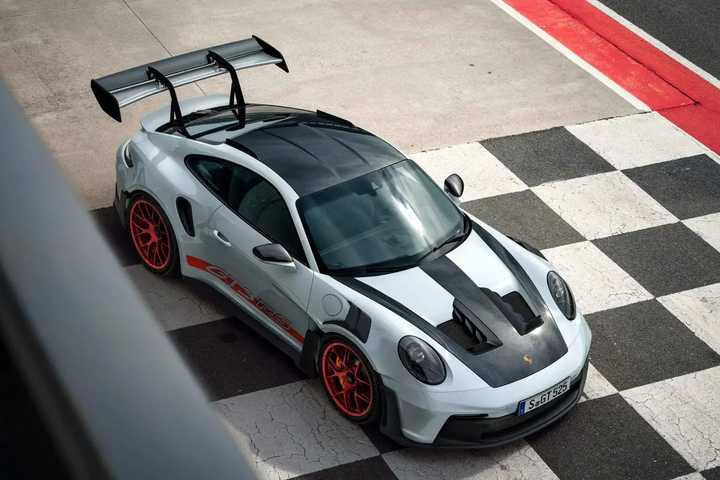

- Base Trim Engine
-
4.0L Flat 6 Gas
- Base Trim Transmission
-
7-Speed Automatic
- Base Trim Drivetrain
-
Rear-Wheel Drive
- Base Trim Horsepower
-
518 hp
- Base Trim Torque
-
342 lb-ft @ 6300 rpm
- Fuel Economy
-
14/18 MPG
- Make
-
Porsche
- Model
-
911 GT3 RS
- 0-60 MPH
-
3.0 Seconds
The 992.1-generation Porsche 911 GT3 RS is not about horsepower wars; it’s about aerodynamics and chassis perfection. With “just” 518 horsepower from its naturally aspirated 4.0-liter flat-six, it’s easy to underestimate this car on paper. But Porsche built the 992.1 RS with track dominance in mind, packing it with a Formula 1-style drag reduction system (DRS), a huge swan-neck rear wing, and motorsport-derived suspension that make it an apex predator.
At 6:54,99, the GT3 RS stunned the world, becoming one of the fastest naturally aspirated cars to ever lap the Ring. Its time wasn’t about brute acceleration, but rather how it carried mind-bending speeds through the corners, leveraging its aerodynamic grip. This is where the Nürburgring rewards finesse – cars with balance and aero mastery simply fly, even when their engines don’t produce four-digit horsepower figures.
The GT3 RS’s lap time is especially telling because it shows how Porsche’s evolutionary philosophy continues to pay dividends. Year after year, the 911 remains a dominant force at the Nürburgring not because it has the most power, but because it has the most complete package.
Mercedes-AMG GT Black Series
Nürburgring Lap Time: 6:52,54
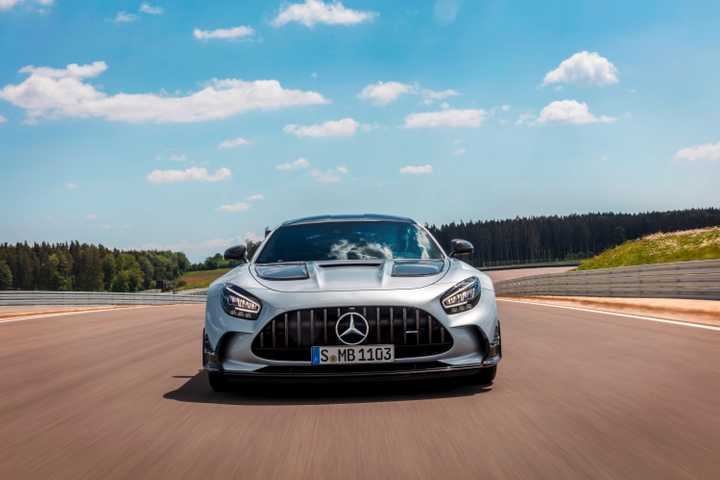

- Base Trim Engine
-
4.0L Twin-Turbo V8 Gas
- Base Trim Transmission
-
7-Speed Automatic
- Base Trim Drivetrain
-
Rear-Wheel Drive
- Base Trim Horsepower
-
720 hp
- Base Trim Torque
-
590 lb-ft @ 2000 rpm
- Make
-
Mercedes-Benz
- Model
-
AMG GT Black Series
- Segment
-
Sports Car
Mercedes-AMG doesn’t do things halfway, and the GT Black Series is proof. With 720 horsepower from a heavily reworked twin-turbocharged 4.0-liter V8, this car was designed to obliterate lap records. But unlike many AMG models that rely on brute force, the Black Series incorporates a motorsport-inspired aero package, lightweight construction, and adjustable suspension that make it a legitimate Nürburgring weapon.
Its 6:52,54 lap time made headlines, putting it ahead of many established track legends. The car’s enormous front splitter, active aerodynamics, and race-spec downforce balance allowed it to stay planted through high-speed sections where lesser cars would falter. That combination of raw power and race-car aero made the AMG GT Black Series one of the most serious threats to Porsche’s long-standing dominance of the Green Hell.
For a brand that historically leaned more toward muscle than finesse, this AMG is a revelation. It shows that even manufacturers not typically associated with Nürburgring mastery can engineer world-class track monsters capable of challenging and beating the best.
Lamborghini Huracán Performante
Nürburgring Lap Time: 6:52,01
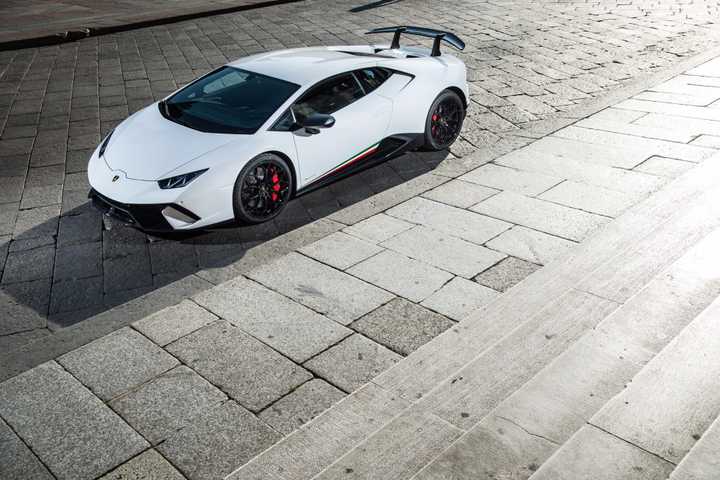

- Base Trim Engine
-
5.2L V10 Gas
- Base Trim Transmission
-
7-Speed Automatic
- Base Trim Drivetrain
-
All-Wheel Drive
- Base Trim Horsepower
-
630 hp
- Base Trim Torque
-
442 lb-ft @ 6500 rpm
- Fuel Economy
-
14/19 MPG
- Make
-
Lamborghini
When Lamborghini unveiled the Huracán Performante, few expected it to become one of the Nürburgring’s most celebrated production cars. Yet thanks to its 640-horsepower V10 and a groundbreaking active aerodynamic system called Aerodinamica Lamborghini Attiva (ALA), it shocked the world by clocking a 6:52,01 lap. This wasn’t just a fast car; it was a statement that Lamborghini could compete head-to-head with Porsche on its own proving grounds.
The ALA system played a huge role in the Performante’s success. By dynamically adjusting aero load between the front and rear, the car maintained perfect balance through the track’s most demanding sections. Combined with a screaming naturally aspirated engine and all-wheel drive traction, it proved to be both ferocious and controllable, even on the limit.
For many enthusiasts, the Huracán Performante represents the ultimate modern Lamborghini: wild in spirit but calculated in execution. It’s a car that didn’t need 1,000 horsepower to dominate, and in doing so, it cemented its place as one of the greatest supercars of the last decade.
Porsche 911 GT3 (992.2)
Nürburgring Lap Time: 6:51,76
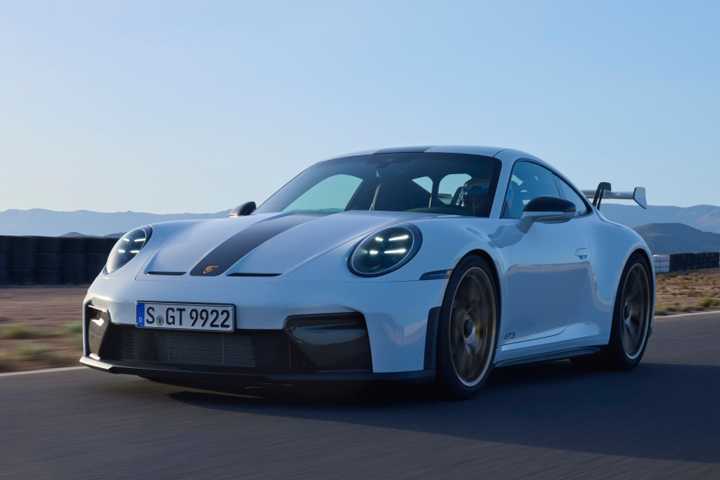

- Base Trim Engine
-
4.0-liter flat-6 gas
- Base Trim Transmission
-
6-Speed Manual
- Base Trim Drivetrain
-
Rear-Wheel Drive
- Base Trim Horsepower
-
502 hp
- Base Trim Torque
-
331 lb-ft
- Make
-
Porsche
- Model
-
911 GT3
- Segment
-
Sports Car
The Porsche 911 GT3 (992.2) is the latest iteration of Porsche’s most driver-focused model, and it wasted no time rewriting the record books. Powered by a 4.0-liter flat-six producing 518 horsepower, it might not sound groundbreaking in the age of hypercars, but its engineering sophistication is unmatched. With enhanced aerodynamics, suspension upgrades, and more refined chassis tuning than its predecessor, the 992.2 GT3 pushes the limits of what a naturally aspirated sports car can do.
Clocking a lap time of 6:51,76, it edges out even the mighty GT3 RS (992.1), showcasing Porsche’s relentless pursuit of incremental improvements. The difference isn’t in massive horsepower gains but in how efficiently the car translates its abilities to the tarmac. At the Nürburgring, those tiny improvements add up to seconds, and that’s the difference between greatness and legend.
The GT3’s lap is arguably one of the most impressive feats in modern performance cars. In a world obsessed with power figures, this car proves that balance, control, and meticulous engineering can allow a “mere” 500-horsepower sports car to hang with, and even beat, cars three to six times more powerful.








